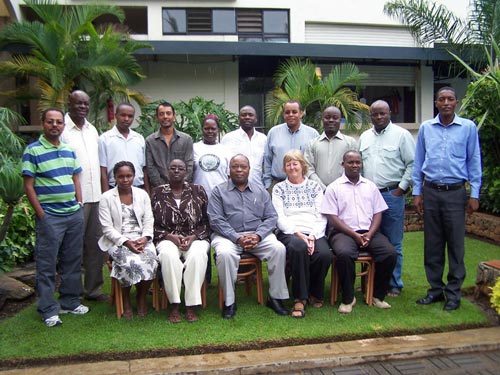 Have you ever wondered why the papers you have written on a piece of innovative research are rejected by your target peer-reviewed journals, or why your colleagues in similar projects are publishing with less difficulty? It could be that you are not writing in a style that is acceptable by the journals. For this reason Insect Resistant Maize for Africa (IRMA) and its sister project Water Efficient Maize for Africa (WEMA) have been conducting annual scientific writing workshops for their project scientists and students based in Nairobi. This year’s IRMA/WEMA Writing Workshop, which was attended by 15 participants, was held in Nakuru, Kenya during 07–11 May 2012.
Have you ever wondered why the papers you have written on a piece of innovative research are rejected by your target peer-reviewed journals, or why your colleagues in similar projects are publishing with less difficulty? It could be that you are not writing in a style that is acceptable by the journals. For this reason Insect Resistant Maize for Africa (IRMA) and its sister project Water Efficient Maize for Africa (WEMA) have been conducting annual scientific writing workshops for their project scientists and students based in Nairobi. This year’s IRMA/WEMA Writing Workshop, which was attended by 15 participants, was held in Nakuru, Kenya during 07–11 May 2012.
The objectives of the workshop were to: train the participants on how to write scientific papers; demonstrate how to write technical papers in English; break down the process of journal choice, submission, reviews, and publication; provide assistance in completing manuscripts; and to draft new technical papers.
Stephen Mugo, principal scientist, Global Maize Program (GMP) and the IRMA/WEMA team leader, notes that publishing is the most effective way to disseminate research findings to fellow researchers, extension and development agents, and farmers. It is the best way to advance science and also provides an opportunity to account for resources provided by donors. GMP scientists are encouraged to publish at least one or two articles per year.
Reiterating the importance of publishing, maize breeder Biswanath Das of the Improved Maize for African Soils (IMAS) project stated, “Considering that we are working in public institutions, we have an obligation to share our research findings.” He was one of the scientists outside the IRMA and WEMA projects who were attracted to the writing workshop. There are plans to expand participation in the workshop to include more scientists from other CIMMYT projects in Kenya.
Mugo noted that the workshop is particularly important in training young professionals and students in scientific writing. This kind of retreat is a sure way of getting publications out in the shortest time possible.
Indeed, the number of papers published in peer reviewed journals is steadily increasing, from six in 2010—when the projects held their first writing workshop—to 16 in 2011. By the end of April 2012, seven papers had been published. Another six papers have been submitted to various journals, while 23 more are being drafted with authors promising to submit by the end of July this year.
For Murenga Mwimali, a PhD student, the workshop provided him with an opportunity to sharpen his skills in scientific writing. It was also an opportunity for him to consolidate data findings and to write papers based on research done within the IRMA/WEMA projects.
The workshop was facilitated by Stephen Mugo and Liz Lucas, consulting copy editor. They would like to thank Hugo De Groote for his work in compiling resources for these workshops.
 Capacity development
Capacity development 
